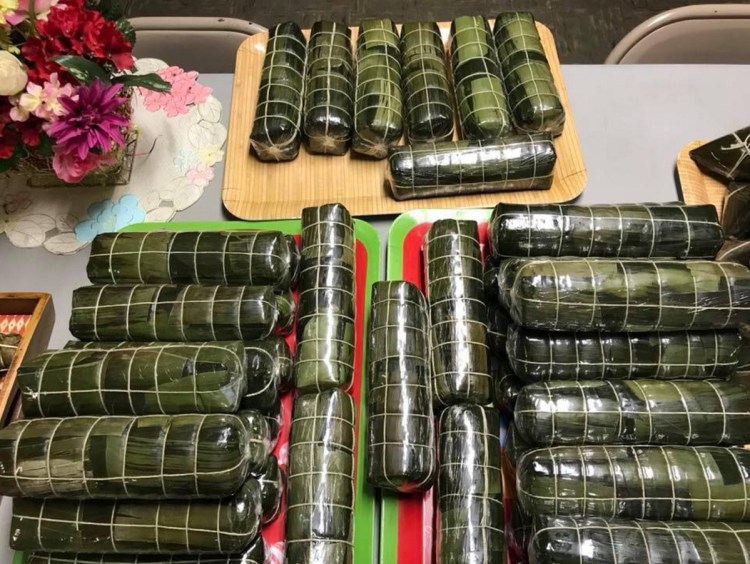In Vietnam, the Lunar New Year celebration known as Tet is a major event. Decorations fill city streets, businesses shut down for days and families gather to remember their ancestors, pay respect to their parents, honor their teachers and eat traditional foods.
Here in the Greater Portland area, the Peace Buddhist Center in South Portland has been preparing all week for Tet, which begins with the new moon on Feb. 5. The food prepared at the temple is always vegan, and for Tet it includes two slow-cooked, traditional dishes: banh tet and banh chýng.
The temple’s monk, the Venerable Duc Minh, recently spoke with me about the holiday. We had translation help from businessman Quang Nguyen, who is an active member of the local Vietnamese Buddhist community.
“Banh tet is round and represents the sky, and bánh chýng is flat and represents the Earth,” Minh said. He explained that bánh tét symbolizes fathers, and bánh chýng represents mothers.
“We make them to show that we appreciate the sacrifice that mom and dad give us,” Minh said. “We bring them to the altar to remember all the generations before.”
Shapes aside, the ingredients in the vegan versions of these dishes are the same: sticky rice and mung beans. Non-vegan versions often contain pork.
The first step in making these dishes, Minh said, is to soak the sticky rice and mung beans overnight. The next day the ingredients are rinsed and seasoned with salt and spices. The mung beans and rice are cooked and then layered onto banana leaves, with the mung beans in the center. They are wrapped, molded and then boiled for eight hours. Before they are eaten, they get unwrapped and sliced.
In Vietnam, vegetarian food is commonplace, and most meat-based dishes have a vegetarian version, indicated by the word “chay.” Vegan food is prepared and enjoyed at the South Portland temple every Sunday, and typically includes spring rolls, rice cakes, Vietnamese pancakes and vermicelli. Banh tet and banh chýng are reserved for the Lunar New Year.
“Tet (in Vietnam) is very like Christmas and Thanksgiving over here,” Nguyen said. “We go to the temple or celebrate at home… The temple is very important for the community to keep the culture and to educate a new generation about the culture we are from.”
Anyone is welcome to visit the temple on Tet to buy food or to enjoy the ceremonies. Food shoppers are welcome in the morning or in the afternoon. Those who want to participate in the Tet ceremony, which is delivered in Vietnamese, should arrive by noon.
In “Vegetarian Viêt Nam,” Cameron Stauch describes the two schools of Buddhism: Mahayana and Theravada.
“In general, Theravada Buddhist monks and nuns believe that it’s fine to eat meat or seafood if the meat or seafood was not killed specifically for their consumption,” Stauch writes. “By contrast, Mahayana Buddhists consider animals to be sentient beings. Not eating meat or seafood limits the suffering of animals and is a way to cultivate compassion. Devout Mahayana Buddhists will therefore never eat meat. Lay Mahayana Buddhists may decide to eat vegetarian a couple of times a month or for an entire month.”
The Peace Buddhist Center in South Portland is of the Mahayana school.
The temple is located in a former Methodist church on the corner of Elm and Chapel streets that the Lumbini Buddhist Association of Lawrence, Massachusetts bought in 2015. Before acquiring the former Christian church, local Vietnamese Buddhists had to travel to Lawrence for special celebrations such as Tet.
Vietnamese Buddhists have been renovating and restoring the historic building, which was built in 1898. From the outside, the most visible change is the large, white statue of Buddha that faces Chapel Street. Inside the former parish hall, a giant seated Buddha statue adorned with color is surrounded by altars and hanging red paper lanterns. The gleaming wood floor is covered with red burgundy area rugs.
During Tet, two artificial trees with silk flowers flank the altar. The tree with yellow blooms represents a mai tree, and the pink tree represents the hoa dao tree. In Vietnam, both are in blossom during the Tet celebrations.
“There’s a tradition that you don’t sweep your floor or clean your dishes for first three days (of Tet) because you’ll sweep out the good luck,” Nguyen said. “We give red envelopes (with money in them to children) to celebrate the new age. We eat traditional food at home and at temple. We go to temple to make a wish for the new year.”
After the wishes are made and the ceremony is over, temple-goers start the new year by enjoying fellowship and a feast of traditional vegan food.
Avery Yale Kamila is a food writer who lives in Portland. She can be reached at:
avery.kamila@gmail.com
Twitter: AveryYaleKamila
Send questions/comments to the editors.



Comments are no longer available on this story